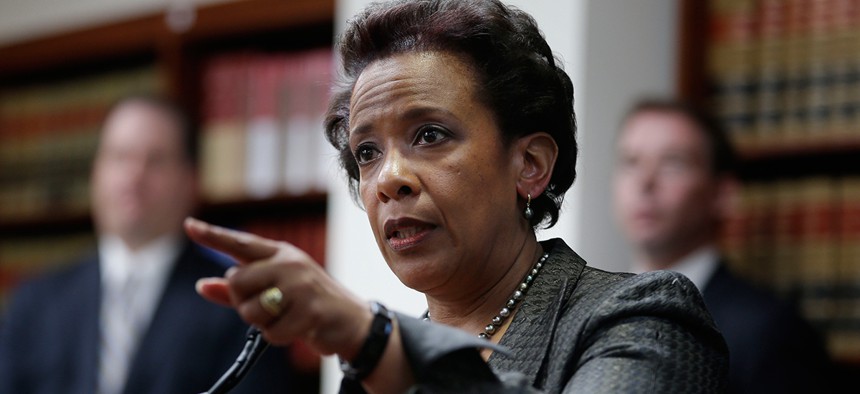
Seth Wenig/Shutterstock.com
Paul Attacks Loretta Lynch on Civil Asset Forfeiture
At a hearing Wednesday, the senator tested a new argument in his case against Lynch’s confirmation.
Congress is taking notice of a murky law that allows police officers to seize money and property from citizens with near impunity—and Sen. Rand Paul is using it as an argument against Loretta Lynch's attorney general nomination.
Sen. Chuck Grassley, who is traditionally hawkish on criminal justice reform, convened a Judiciary Committee hearing on Wednesday to talk about civil asset forfeiture.
Civil asset forfeiture is a police tactic that has only recently come under scrutiny in Congress. It basically allows police officers to seize assets—including cash, cars, and houses—from practically anyone they suspect of committing a crime, or are even tangentially related.
Often, police officers do not need warrants to seize property under civil forfeiture, and departments can keep seized assets even if the owner is proven innocent. The law allows for state and local agencies to pad their budgets with seized money and property (for a more thorough explanation of the topic, watch John Oliver's segment).
Civil forfeiture can serve a more altruistic purpose in law enforcement, but in recent years, officers have taken extreme liberties with the law, using it as an excuse to take cash from motorists during routine traffic stops or, in one case, seize the house of a Philadelphia family whose son was suspected of selling $40 worth of heroin.
Lynch, whose nomination to replace Eric Holder as attorney general has stalled in the face of Republican opposition, has a dubious record on civil forfeiture. Back in November, The Wall Street Journal reported that the Eastern District of New York—which Lynch oversees as U.S. attorney—took in more than $113 million in civil assets between 2011 and 2013.
One of those cases involved a trio of brothers who run a distribution company in Long Island. In 2012, federal agents seized nearly $500,000 from Jeffrey, Richard, and Mitch Hirsch, but never charged them with a crime. In January—after the Hirsch case gained greater national attention, and a week before Lynch's Senate confirmation hearings began—Lynch's office quietly returned their money.
Paul has been one of the staunchest opponents of Lynch's confirmation, and one of the Senate's most outspoken critics of civil forfeiture. At Wednesday's hearing, he brought up the Hirsch brothers' case, accusing Lynch's jurisdiction of accruing a "Herculean" level of civil forfeiture and saying Lynch seems "unconcerned with the need for reform."
At the hearing, Paul—who was there as a witness, not a senator on the panel—argued that civil forfeiture disproportionately impacts the poor and minorities. A Washington Post exposé from September found that minorities made up the majority of federal cases where people challenged the government's seizures and ended up recouping some of their money.
It's hard not to see Paul's activism on this and criminal justice reform in general as part of his 2016 campaign pitch. It's a position that he hopes will resonate with traditionally Democratic voting blocs, including black and Hispanic voters.
Paul's criticism of Lynch—that she allowed her district to overstep its bounds and interfere with due process—brings a libertarian argument to the otherwise predictably partisan opposition. Still, it's unlikely to convince any of Paul's Democratic colleagues to oppose her nomination. But serving as an expert witness on an issue that he thinks is important to a constituency he thinks he has a shot at winning over is a small victory nonetheless.







